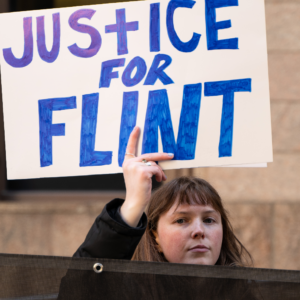Last month, we marked the ten-year anniversary of the Flint water crisis.
Yes, you read that right: Ten years since Flint residents were exposed to poisoned water. Ten years that residents have been forced to use bottled water for drinking, cleaning, and cooking. And ten years without a trace of accountability for the government leaders and corporations involved, or justice for the people of Flint.
That’s why we joined our allies at Flint Rising and water justice organizations across the U.S. to make sure that this crisis, which continues to impact the health and well-being of thousands of residents in Flint who do not have reliable access to safe water, is not forgotten.
Together, we demanded that those who played a role in the crisis—from the state officials who stripped away local democracy and made the decision to switch the city’s water source, to Veolia, the private water corporation that failed to sound the alarm when it had the chance—pay for the harm to Flint residents.
On April 25, the day of the anniversary, organizers in Boston, New Orleans, and Pittsburgh gathered in person to show their solidarity with the people of Flint, expose the role that Veolia played in the crisis, and pressure the attorney general of Michigan to hold all those who played a role accountable. We made our demands loud and visible to people who would otherwise make it through their day not knowing Flint’s crisis was now a decade long.
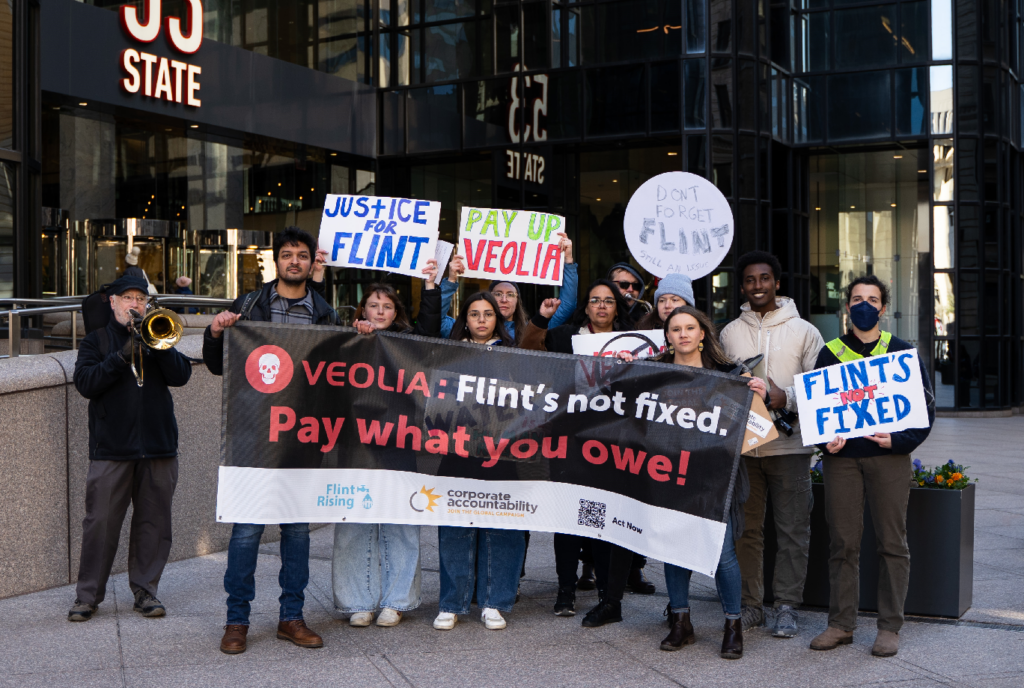
In Boston, Corporate Accountability staff, members, and volunteers rally outside of Veolia’s North American headquarters. Photo credit: Binita Mandalia
Flint’s not fixed: Exposing Veolia on the day of its annual shareholders’ meeting
As Veolia executives hosted the corporations’ annual shareholders meeting in Paris, a dozen Corporate Accountability staff, members, and volunteers rallied outside of its North American headquarters in Boston to uplift a story that we knew would not be on its agenda: its role in Flint.
Early in the crisis, the city of Flint contracted Veolia to assess its water system. The corporation said the water was safe at a city council meeting. And later, we helped uncover that Veolia executives had been discussing the potential for lead contamination in internal emails just days before.
We exposed the corporation’s complicity in the middle of morning rush hour, catching the attention of hundreds of people on their walk to work. Together and with the support of a local brass band, we sang songs, called out chants, and handed out fliers to demand that the corporation pay what it owes to the people of Flint.
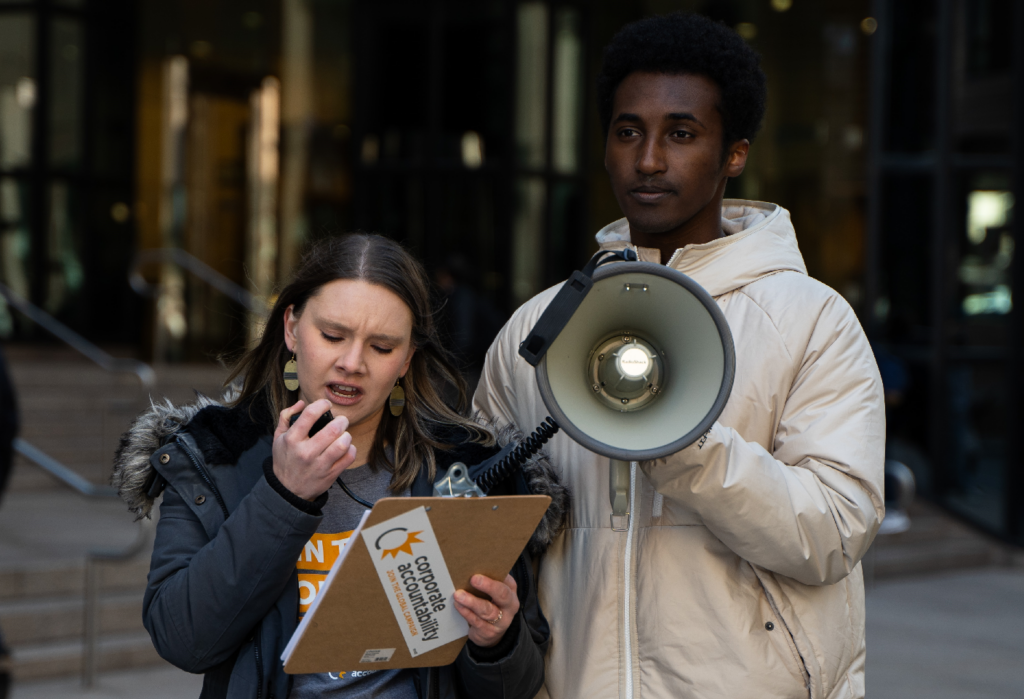
Corporate Accountability organizer Keltie Vance, and member Chris Mesfin, an environmental justice organizer and student at Harvard University, speak out about Veolia’s role in the crisis. Photo credit: Binita Mandalia
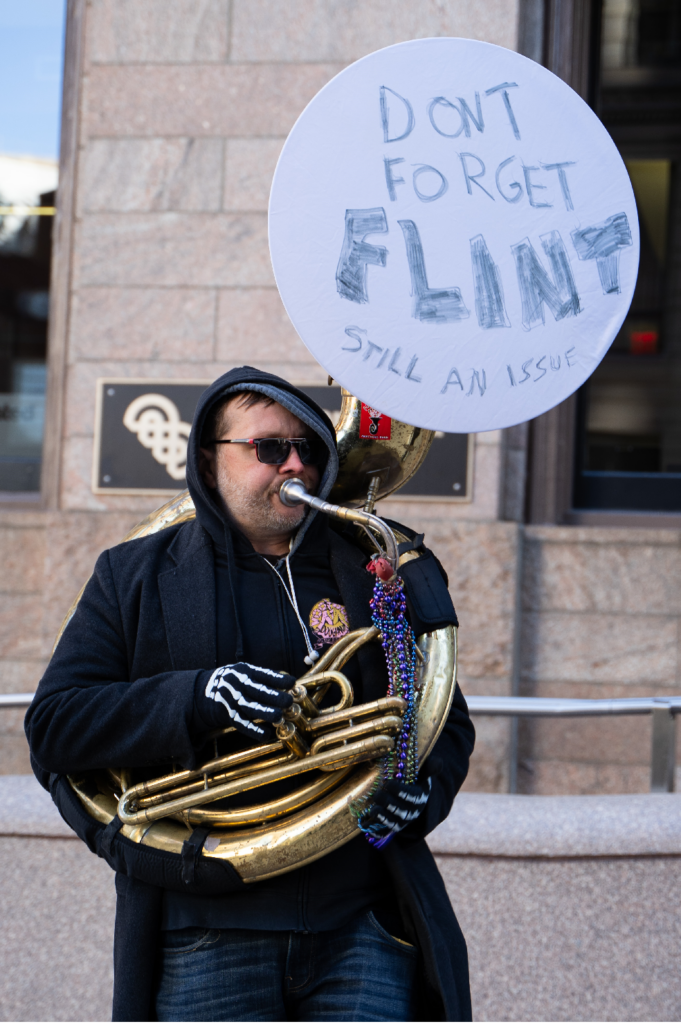
The Boston Area Brigade of Activist Musicians (BABAM) bring their music to enliven the scene and draw attention from commuters passing by. Photo credit: Binita Mandalia
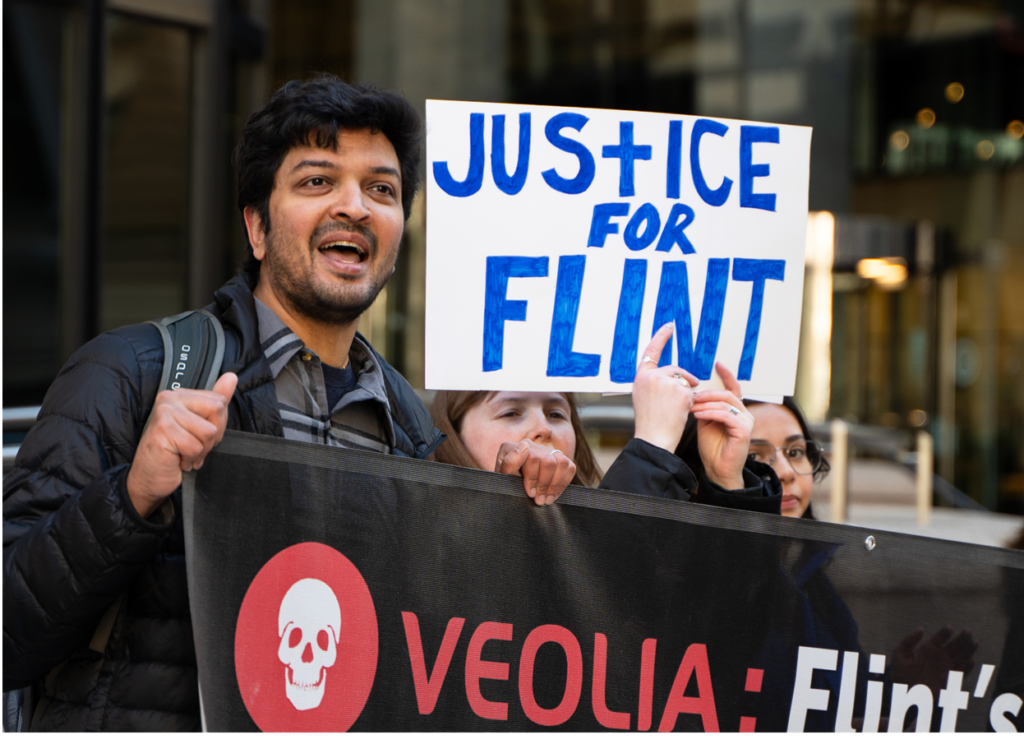
Neil Gupta, Corporate Accountability’s water campaign director, stresses how time and again, Veolia prioritizes its profits, while people and communities pay the price. Photo credit: Binita Mandalia
Uniting to keep water public across the U.S.
Our allies at Pittsburgh United brought together water activists to voice their support for the people of Flint alongside dozens of local organizations. “We are deeply rooted in the belief that clean, accessible water is a fundamental human right and we demand restorative justice from Veolia and other bad actors that have compromised the safety and integrity of our water,” said Gabby Gray, organizer with Pittsburgh United’s Our Water Campaign.
Gaby reflected on Pittsburgh’s experiences with Veolia, as the city had to deal with the fallout from the corporation’s mismanagement. Under Veolia’s management, Pittsburgh’s water authority switched a corrosion control chemical to a cheaper alternative without the required state approval. A lead contamination crisis across the city followed. And while Veolia walked away with over $11 million from its contracts, local officials were left to find hundreds of millions of dollars to replace pipes leaching lead.
In New Orleans, the Water Collaborative of Greater New Orleans held a community education event where they mobilized people to take action to support Flint and sign up for a local lead testing program.

Taya Fontenette and Tyneisha Bradley show a sample lead pipe to New Orleans residents. Photo credit: Courtesy of VonnieArt.com

Led by the Water Collaborative of Greater New Orleans, people in the city gather to reflect on the threat to water access in the U.S. and around the globe, which is driven by corporations. Photo credit: Courtesy of VonnieArt.com
Veolia makes millions of dollars from New Orleans residents through its control of wastewater plants. Speaker Keree Blanks, field infrastructure and engagement coordinator with the Water Collaborative, reminded attendees of what’s at stake for people in Flint and other cities in the U.S. whose water systems have been historically and purposely deprioritized. “Potable water is a human right that we are each born with…but our water is in danger,” he said. “The cause is not only the climate crisis, but also systemic mismanagement and disinvestment from communities of color, anti-democratic resource grabs, and corporate capture of what should be public systems.”
Everyone—no matter where they live or how much money they have—has the right to safe, affordable public water. And for millions of people around the world, in Flint and beyond, this right is under threat.
By coming together over our vision for justice, we’re reminded that we’re not alone. Together, we can compel corporate behemoths and government officials to acknowledge harms, pay what’s owed, and meet community demands.
